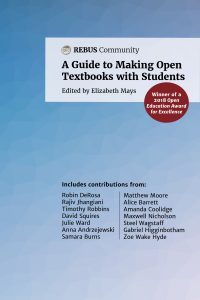44 OER Examples
Have you found any open projects that you find particularly exciting or interesting? Please feel free to add a project link and description in the shared suggestions document below and we’ll update this list to include it.
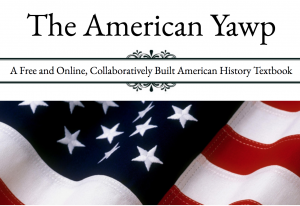
The American Yawp
This open, multimedia textbook results from a wide-ranging collaboration of authors from an impressive range of universities. The American Yawp provides both a primary source reader and athematic overview of American history.
Many of the contributors are from the University of Wisconsin, including Stephen Kantrowitz, Jesse Gant, James McKay (an ongoing contributor to UW’s OER and Pressbooks efforts), Simon Balto, Megan Falater, Margaret Flamingo, Erin B. Kramer, and Naomi R. Williams.
A Guide to Making Open Textbooks With Students
A Guide to Making Open Textbooks With Students is a handbook for faculty interested in practicing open pedagogy by involving students in the making of open textbooks, ancillary materials, or other Open Educational Resources. Steel Wagstaff of Learning Support Services and Anna Andrejewski, professor of Art History at UW-Madison, were two of the contributors to this text.
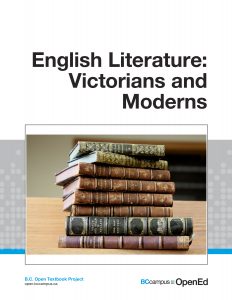
English Literature: Victorians and Moderns
English Literature: Victorians and Moderns provides annotated teaching editions of commonly taught texts from Victorian and Modern poetry, fiction, and drama. It also provides a series of guided research casebooks which make available numerous published essays from open access books and journals as well as several reprinted critical essays from established journals (shared with the permission of the authors and editors). Designed to supplement the annotated complete texts of three famous short novels, (Henry James’s The Turn of the Screw, Joseph Conrad’s Heart of Darkness, and Aldous Huxley’s Brave New World,) each casebook offers cross-disciplinary guided research topics which will encourage majors in fields other than English to undertake topics in diverse areas, including History, Economics, Anthropology, Political Science, Biology, and Psychology. Selections have also been includedto encourage topical, thematic, and generic cross-referencing. Students will also be exposed to a wide-range of approaches, including new-critical, psychoanalytic, historical, and feminist. Finally, the open text contains 3 practical appendices: a glossary of literary terms, detailed instruction in writing about literature, and thorough guidance in documenting the research paper in accordance with current MLA guidelines.
This is part of the BCcampus Open Textbook Project. Dr. James Sexton is the primary author of this text, but multiple other editors and contributors took part in the composition process.
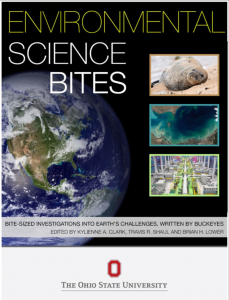 |
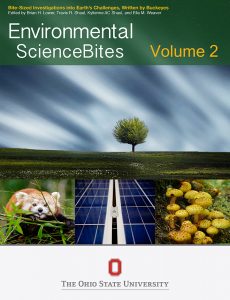 |
Environmental Science Bites (Vols. 1-2)
Environmental Science Bites Volume 1 and Environmental Science Bites Volume 2 are great examples of Open Pedagogy in practice.
These texts were written by undergraduate students at The Ohio State University (OSU) who were enrolled in the class Introduction to Environmental Science. The chapters describe some of Earth’s major environmental challenges and discuss ways that humans are using cutting-edge science and engineering to provide sustainable solutions to these problems.
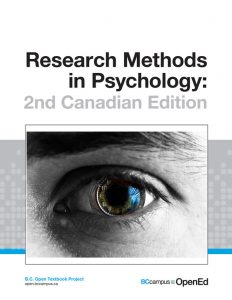
Research Methods in Psychology, Second Edition
Research Methods in Psychology is part of the BCcampus Open Textbook Project and was co-authored by Rajiv S. Jhangiani (Kwantlen Polytechnic University) and I-Chant A. Chiang (Quest University Canada)Paul C. Price, Rajiv S. Jhangiani, and I-Chant A. Chiang.
One of the noteworthy aspects of this resource is the way that the authors describe the adaptation process that the text has undergone from its initial publication to its current form. You can find this account by navigating to the cover page of the Research Methods in Psychology text and scrolling past the table of contents section to the “Book Information” section.
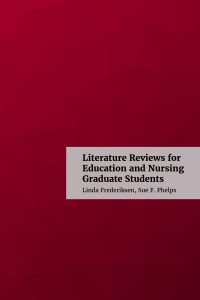
Literature Reviews for Education and Nursing Graduate Students
Literature Reviews for Education and Nursing Graduate Students is designed for students in graduate-level nursing and education programs. This text guides readers through the process of developing a research question to locating and evaluating sources to writing a sample literature review using appropriate publication guidelines. The book was produced by Linda Frederiksen and Sue F. Phelps in collaboration with members of the REBUS Open Texbook Authoring community. It has been peer-reviewed by seven subject experts.
One of the noteworthy aspects of this text is the inclusion of an accessibility assessment page.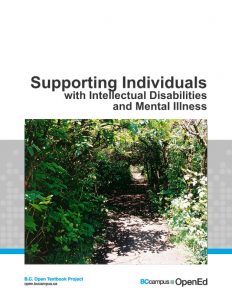
Supporting Individuals with Intellectual Disabilities & Mental Illness: What Caregivers Need to Know
Supporting Individuals with Intellectual Disabilities & Mental Illness is a multidisciplinary resource that develops topics of interest to those who care about and for individuals with co-occurring intellectual disabilities and mental illness. Each chapter presents current evidence-informed practice knowledge. Each topic is also presented with audio-enabled text boxes emphasizing ‘Key Points for Caregivers.’ For those who are interested in background knowledge, the authors provide a comprehensive literature base. For those interested mainly in ‘what to do,’ the authors provide text box summaries that can be accessed in print and audio formats. This is part of the BCcampus Open Textbook Project.
One of the noteworthy aspects of this text is the way in which its authors have produced a multimedia resource that can function in multiple formats–(print, epub, pdf, and web). For an example of their use of audio interaction symbols and QR codes, visit the first chapter, “Support Work: The Fundamentals.”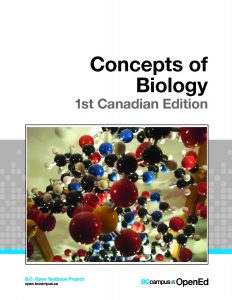
Concepts of Biology (1st Canadian Edition)
Concepts of Biology was curated by Charles Molnar and Jane Gair and is intended to be a survey text for college students not (currently) planning to major in biology. This is a richly multimedia textbook.
Two of the noteworthy aspects of this resource:
- It is an adaptation of an OpenStax OER textbook by authors within the BCcampus Open Textbook community
- In addition to providing content for students to interact with, Molnar and Gair include powerpoints and videos for instructors and students to adapt for their own purposes.
Simulator Laboratory
The Simulator Laboratory (SIMLAB) book was created by to provide ancillary resources for Thermodynamics and Thermal Power Plant Simulator courses. It is intended to act as a collection of exercises to help students merge the theory covered in the classroom with the practice performed in the labs.
We welcome contributions to this list!
If you would like to access this page in a larger frame, this link will take you directly to the shared Examples Suggestions Document above. If you’d prefer, you can post a Hypothes.is comment with your suggestions instead.
*Note – it may take you one or two clicks inside this frame for the Google document to allow typed input.
